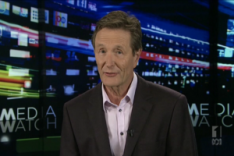Media Watch slams changes to TV code favouring advertisers, dubs ACMA a ‘watchpuss’
 Media Watch host Paul Barry has questioned the need for a television regulator and described the media watchdog as a “watchpuss” after a large number of restrictions on free-to-air broadcasters were scrapped.
Media Watch host Paul Barry has questioned the need for a television regulator and described the media watchdog as a “watchpuss” after a large number of restrictions on free-to-air broadcasters were scrapped.
The ABC host’s criticism of changes to the Television Code of Practice comes at the same time as the Australian Association of National Advertisers has welcomed the changes to the codes governing broadcasters.
Barry has filleted the new code launched by the Australian Media and Communications Authority last week, concluding that the broadcasting watchdog had “rolled over” in the face of pressure from Free TV to loosen regulations.
During Monday night’s show Barry took an extensive look at changes in the code, noting that the requirements for identifying advertising had been changed, moving away from transparency for viewers needing to know if shows had been paid for by advertisers.
“The new code will also make it easier for the networks to bombard us with advertorials like Seven’s sponsored special on the wonders of Royal Caribbean Cruises,” said Barry.
“Currently the networks have to tell viewers in the program or the credits that this sort of puffery has been paid for.
“But under the new code, all they’ll need to do is mention it on their website, where most of course will never see it.”
Barry also criticised changes to the complaints procedure, noting that viewers must have seen programming on traditional terrestrial TV, and not online through catchup services or social media pages – a move he said made a mockery of ACMA chairman Chris Chapman’s assertion that the new rules reflected “the reality that television is operating in a new digital era”.
“Yes, if you’re appalled by a program you see on catch-up TV, or on Seven, Nine or Ten’s website, or on any of the networks’ Facebook pages, don’t bother to write in. You have to have seen it on the old fashioned telly,” said Barry.
Other issues Barry has raised include the removal of requirements that current affairs shows must not present material in a manner that creates public panic, and that they are not longer required to be impartial.
“Well, if that is really the best it can do to fight for standards on commercial TV, is there any point in having a regulator?” he said.
The AANA said while the new code maintained rules that restricted ads, it did allow more scope for brands.
“There is an incremental change in the ability to advertise alcohol on weekends and public holidays during the broadcast of sports programs,” a spokesperson said.
“The AANA and Alcohol Beverage Advertising Codes contain comprehensive community safeguards to help ensure that the content of all alcoholic beverage advertising is responsible and does not have particular appeal to minors. This includes the robust independent pre-vetting and complaints’ handling system that currently exists and which applies across all media.”
Under the new code alcohol ads will now be allowed on weekends and public holidays in all sports broadcasts during PG programming hours and not be restricted to only live sport broadcasts.
The AANA also welcomed the overall changes to the code which it said would remove duplication while offering greater protection to consumers.
Simon Canning




Just a point that there was no requirement for current affairs programs to be impartial in the old code. It’s just that the new code emphasises the point that CA programs DO NOT need to be impartial.
User ID not verified.
Is this good social change? Not from where I sit..
User ID not verified.
Love the new code saying that only complaints from people who watched programs as they went to air will be counted. That is hilarious.
How many lunches did it take for ACMA to roll over on every one?
User ID not verified.
That’s a bit hypocritical. A few months ago I complained to the ABC about them posting a viciously homophobic episode of Monday Conference from 1976 on iView, and I asked why the ABC had saved this program in their archives when they destroyed seven years of Countdown and the entire three years of Flashez. I never received a reply.
User ID not verified.
There are people that still watch the commercial networks? Just wow.
User ID not verified.
What the new code means is that “current affair” programmes like ACA can in future broadcast episodes such as the one which claimed a western Sydney shopping mall was being “taken over by Asians” without needing to apologise or to take down the offending episode by ACMA ruling ie they do not need to need to do anything now. This example was made clear on Media Watch. But let’s face it. Even the old code lacked bite to take action. When ACA made factual errors they got away with the standby excuse that it was merely “presenting opinion”.
User ID not verified.
FTA is burying itself in stupid. Fine, hasten your demise.
User ID not verified.